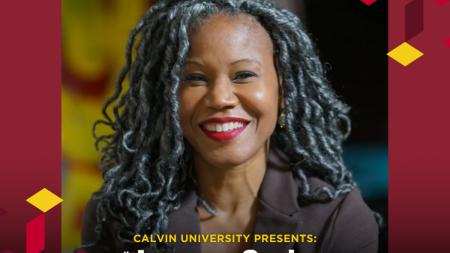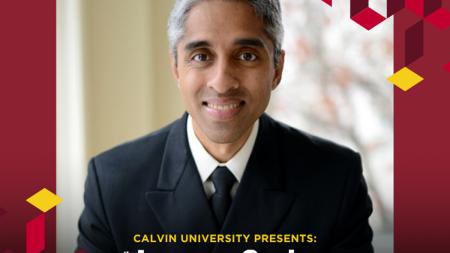Symposium Sermons Highlight Hope

The 15-day Online Calvin Symposium on Worship 2021 concluded on Tuesday afternoon, Jan. 26, with an online worship service from the Duke University Chapel that included a sermon by Luke Powery, dean of the chapel.
One of six preachers who led services and gave sermons based on Romans 8 during the symposium, Powery spoke on Romans 8:31-38. The title of his sermon was “In All These Things.”
In a webinar held on Tuesday morning and featuring this year’s preachers, Powery said that for his sermon he had in mind the tensions — the pandemic, racial strife, and political divisions — that we all experienced in the past year.
Most of the sermons given during the symposium were recorded before the event began, and they were slotted into specific times of worship throughout the event.
Powery preached his sermon on Sunday, Nov. 1, just before the U.S. presidential election, and said that was on his mind as he spoke. The tension of that time had been building up, he said, and he thought of how Romans 8, written by the apostle Paul, moves through a series of challenges and questions and builds to a powerful conclusion.
“I thought about a whole crescendo of events,” he said. “For me, it was a movement from the ‘whole creation groaning’ [Rom. 8:22] to speaking about the glory of God’s love, which is what we are ultimately groaning for at the end of the day.”
In his sermon, Powery also spoke about the hope we can receive — in connection with our hope in Christ — in realizing that Christians throughout the centuries have also faithfully faced pandemics and other challenges.
“This is nothing new for the saints, for the cloud of witnesses,” said Powery. “We can take encouragement from that.”
The symposium kicked off on Jan. 6 this year with a service in the Calvin University chapel and a sermon by Mary Hulst, the university chaplain.
Titled “No Condemnation,” her sermon came from Romans 8:1-8, which begins: “Therefore, there is now no condemnation for those who are in Christ Jesus, because through Christ Jesus the law of the Spirit who gives life has set you free from the law of sin and death.”
Hulst preached on how, in her role as chaplain, she often speaks with university students who condemn themselves, telling her they feel they never measure up, that they battle depression and a sense of being unworthy.
In her sermon, she sought to use the letter from Paul to comfort young people, letting them know how they can move beyond the sense of forever falling short.
She explained that “Paul probably felt this as well, but the resurrection of Christ changed everything.”
For it is the resurrection, she said, “that allows us to hear the voice of Jesus instead of the voice of condemnation.”
Anne Zaki, who teaches practical theology at the Evangelical Seminary in Cairo, Egypt, preached from Romans 8:14-17 on Thursday, Jan. 14, from Heliopolis Evangelical Church.
Before giving her sermon, titled “The Children of God,” Zaki said she had recently spent 22 days sick in bed with COVID-19. As she lay there, quarantined from her family, she said, she thought of the verses on which she would preach, especially verse 14, which says, “For those who are led by the Spirit of God are the children of God.”
“I was so sick and tired that I had no chance for God to talk to me, unless he talked to me in a dream,” she said. “I gave up trying to find God and let God find me — and I came to see I am a child of God and that’s what matters. God would take care of me in my sickness.”
This experience added depth and meaning to her sermon. It allowed her to share a little of what she went through. But right after her sermon, Zaki said, she had to take a nap.
Preaching on Romans 8:18-25 was Najib Kassab, leader of the World Communion of Reformed Churches, whose sermon, titled “Eager Expectation,” was part of a worship service that included churches and worshipers from around the world.
Kassab lives in Beirut, Lebanon, the scene of a massive explosion of chemicals in a warehouse along the city’s waterfront on Aug. 4, 2020.
She explained that in part because the explosion destroyed hospitals, the COVID-19 pandemic is taking an especially deadly toll in her city. No beds are available for people who are infected with the virus, and no money is available to pay for vaccines.
In Romans 8:18-19 the apostle Paul says: “I consider that our present sufferings are not worth comparing with the glory that will be revealed in us. For the creation waits in eager expectation for the children of God to be revealed.”
Reflecting on these words, Kassab said, “I preached on how we can live between suffering and hope. How do we do that in a total lockdown? How do we speak at a time when people have lost their jobs and their homes because of the explosion?”
In her sermon, she said, she didn’t use hope as a “cushion word,” as an empty expression of what is ahead of us.
She preached, she said, about the need for people, in this time of great distress, to search for a sure and solid hope right in front of them.
“Look for God at work in the little things,” she said, like being able to go out and obtain medicine for a sick neighbor, for being able to pray and worship, for the chance to spend time with members of your family. Hard as it is to believe, she said, “even in the middle of our pain, there is hope. God gives us strength at these moments as we wait in expectation for something glorious to happen.”
Eric Barreto, a professor of New Testament at Princeton Theological Seminary, spoke on Romans 8:26-30 in an online service posted on Jan. 21.
In this Scripture passage, Paul writes that “the Spirit helps us in our weakness. We do not know what we ought to pray for, but the Spirit himself intercedes for us through wordless groans.”
When we are feeling weak and unsure of what to pray for, Barreto said, “we are caught up in the gap between what we know and what we don’t know.”
While Paul tells us that all things work together for good (Rom. 8:28), said Barreto, we might think at times such as these — a time of worldwide disruptions — that this is a kind of cheap hope — that this is the kind of hope that “rubs salt in our wounds.”
“But Paul isn’t speaking of hope that is hollow,” Barreto said. “Paul writes of the tangible hope that God promises. There is a weight in this promise that God makes — and it is the weight of the promise given to all of the people who came before.”
It was Luke Powery's sermon then, given from the Duke University chapel, that wrapped up the series on Romans 8, extolling “the glory of God’s love” as he reflected on verses 31-38, which begins with these words: “What, then, shall we say in response to these things? If God is for us, who can be against us?”
For more information and additional resources, see Preaching Romans in Difficult Times and dozens of other presentations at the Symposium on Worship site.


